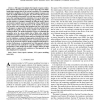Free Online Productivity Tools
i2Speak
i2Symbol
i2OCR
iTex2Img
iWeb2Print
iWeb2Shot
i2Type
iPdf2Split
iPdf2Merge
i2Bopomofo
i2Arabic
i2Style
i2Image
i2PDF
iLatex2Rtf
Sci2ools
115
click to vote
TSP
2010
2010
Noisy data and impulse response estimation
Abstract--This paper investigates the impulse response estimation of linear time-invariant (LTI) systems when only noisy finitelength input-output data of the system is available. The competing parametric candidates are the least square impulse response estimates of possibly different lengths. It is known that the presence of noise prohibits using model sets with large number of parameters as the resulting parameter estimation error can be quite large. Model selection methods acknowledge this problem, hence, they provide metrics to compare estimates in different model classes. Such metrics typically involve a combination of the available leastsquare output error, which decreases as the number of parameters increases, and a function that penalizes the size of the model. In this paper, we approach the model class selection problem from a different perspective that is closely related to the involved denoising problem. The method primarily focuses on estimating the parameter error in a giv...
Related Content
| Added | 22 May 2011 |
| Updated | 22 May 2011 |
| Type | Journal |
| Year | 2010 |
| Where | TSP |
| Authors | Soosan Beheshti, Munther A. Dahleh |
Comments (0)

